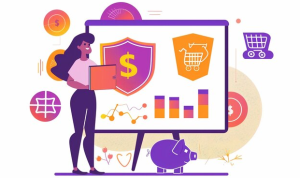In recent years, the growth of e-commerce has transformed the landscape of personal finances in the United States. With the rise of online shopping platforms and the convenience they offer, Americans are finding new ways to manage, spend, and save their money. This digital revolution is changing how consumers approach their budgets, investments, and overall financial well-being.
As e-commerce continues to expand, its influence on personal finances is becoming increasingly significant. The digital marketplace provides a wide array of choices and accessibility that can both positively and negatively impact financial health. Understanding these changes is vital for anyone looking to maintain financial stability in a rapidly evolving economy.
The rise of online shopping and its impact

The surge in online shopping has led to significant changes in consumer behavior. With the ease of purchasing products with just a few clicks, many Americans find themselves spending more frequently and sometimes impulsively. This can lead to unplanned expenses and impact monthly budgets. However, it also offers opportunities for savings through easy price comparisons and access to discounts.
Moreover, subscription services, which have become increasingly popular, can streamline monthly expenses if managed properly. Services ranging from streaming platforms to food delivery can be both a convenience and a financial burden. Evaluating these recurring expenses is crucial for maintaining a balanced financial outlook.
For many, the ability to shop online 24/7 eliminates the constraints of traditional store hours. However, this convenience can also lead to increased impulse buying. Setting spending limits and closely monitoring expenses can help mitigate some of the financial risks associated with the ease of online shopping.
Financial management in the digital age
One significant benefit of the e-commerce boom is the plethora of financial management tools available to consumers. From budgeting apps to online banking, managing personal finances has never been more accessible. These tools can help individuals track their spending, set savings goals, and even invest in the stock market with minimal effort.
Additionally, many e-commerce platforms offer features such as purchase history and receipt storage, which can aid in budget tracking and financial planning. Being able to review past purchases easily allows consumers to make more informed decisions about future spending.
The integration of e-commerce with personal finance tools enables individuals to maintain a more comprehensive view of their financial health. This holistic approach can lead to better financial decisions and improved money management skills over time.
Security concerns and personal finances
While the digital shopping experience offers numerous benefits, it also introduces potential risks, particularly concerning security and fraud. Consumers need to be vigilant about protecting their personal information when shopping online. Using secure payment methods and being cautious about sharing sensitive data can help mitigate these risks.
Fraudulent activities, such as identity theft, can have severe consequences on personal finances. It’s important to regularly monitor financial statements and credit reports to detect any unauthorized activity. Many banks and financial institutions provide tools and services that assist in safeguarding against fraud.
Educating oneself about cybersecurity practices is a key step in preserving financial health in the e-commerce era. Understanding how to spot phishing attempts, using strong passwords, and enabling two-factor authentication are essential measures for safe online transactions.
The future of e-commerce and financial trends
Looking ahead, the growth of e-commerce shows no signs of slowing down. As technology continues to advance, new trends will emerge, further influencing personal finance management. Innovations such as artificial intelligence and machine learning are expected to enhance the shopping experience, making it more personalized and efficient.
With these advancements, consumers will have even more tools at their disposal for managing their finances. Predictive analytics, for example, can offer insights into spending habits and suggest ways to save money. These technologies will continue to shape the future of personal finance.
Furthermore, the rise of mobile commerce, or m-commerce, is making it easier for consumers to shop and manage their finances on the go. Mobile payment solutions and digital wallets are becoming more common, offering greater convenience but also requiring careful attention to security practices.
Adapting to financial shifts
As the digital marketplace evolves, individuals must adapt their financial strategies accordingly. Staying informed about the latest trends and developments in e-commerce is essential for making sound financial decisions. Keeping up with changes in technology and consumer behavior can provide valuable insights into effective money management.
Additionally, seeking advice from financial professionals can be beneficial. Financial advisors can help navigate the complexities of the digital economy and develop strategies that align with individual goals and circumstances. Their expertise can be instrumental in achieving financial stability and growth.
Ultimately, being proactive and flexible in adapting to new financial landscapes will enable individuals to make the most of the opportunities presented by the ongoing growth of e-commerce. Embracing change and continuously updating one’s approach to personal finance are key to thriving in this dynamic environment.
